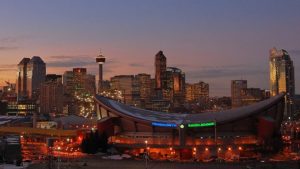Disgruntled Calgary motorists stuck in hours of traffic chaos won’t believe it but the city’s busiest road building summer is going more smoothly than builders expected.
Roads
Good weather means $700 million in infrastructure projects progressing on schedule
Correspondent
Disgruntled Calgary motorists stuck in hours of traffic chaos won’t believe it but the city’s busiest road building summer is going more smoothly than builders expected.
Fifteen major projects, with a total price tag of $700 million, are faring well thanks to fair weather, says Ian Norris, the British-born civil engineer who is the man at the helm when it comes to steering the city through an unprecedented road building spree. Winter was unusually mild and summer has been practically without rain, not good for farmers but excellent for road work.
“It’s been a great year so far,” says Norris, head of the city’s infrastructure and transportation department. “We’ve had more construction days than normal. Last winter really helped. Normally we wouldn’t be working in January, February or March too much. We took advantage of that.”
As a result, the Glenmore Trail interchange, the project with the highest profile that affects the greatest number of motorists, could be finished a few months earlier than its autumn 2007 expected completion date.
Between 2000 and 2004, Calgary invested $830 million into transportation infrastructure—more than was spent in the previous decade. But between 2005 and 2010, the city’s investment in transportation will more than double, the most intense road construction season in history, one that is snarling traffic throughout the entire city.
Almost 63 per cent of the five-year capital budget drawn up in 2004 went to transportation projects because, Mayor Dave Bronconnier pointed out, the city hadn’t kept pace with the rising demands the booming population put on transportation infrastructure. The province has contributed to the traffic chaos – and its eventual resolution – by sharing $3 billion in surplus funds last year with Alberta municipalities to help them catch up with their infrastructure deficit. That gave Calgary $886 million in catch-up infrastructure funding from the province.
The new Glenmore Trail interchange, between Elbow Drive and 5th Street S.W., tops what city hall officials informally call “four or five years of hell”. The huge reworking of the intersection along the only east-west corridor in the city’s south is unprecedented and has had an impact on everyone who lives in the south and isn’t bed-bound.
The project will cost at least $110 million, take three years to complete and cause the demolition of numerous homes and businesses. Early in the work last year, the city brought in a company from Madison, Wis., to drill horizontally under the road to relocate utilities. The crew pulled through 24 separate conduits, setting a world record for that kind of work.
Other major projects include:
• Widening of 16th Avenue North – the TransCanada Highway – between 6th Street N.E. and 10th Street N.W.
• Widening of Bow Trail S.W. from Sarcee Trail to Strathcona Blvd.. Thanks to the weather, that $23 million project is on schedule for end of August completion.
• Building the McKnight Blvd. interchange at 36th Street N.E.
• The Centennial LRT Station at Nose Hill Drive on Crowchild Trail N.W., part of the $183 million northwest LRT extension to Crowfoot Centre which includes widening Crowchild Trail to six lanes between Sarcee Trail and Nose Hill Drive and an interchange at Crowchild Trail and Sarcee Trail N.W.
• Building McKnight-Westwinds LRT station at 64th Avenue and 36th Street N.E..
The new Glenmore Trail-Elbow Drive interchange has been at least 30 years in the making – Mayor Bronconnier lobbied for the project during his first term as mayor at the turn of the century. But while the project made its way on and off capital budgets, the price kept going up.
What was estimated to cost $62.5 million in 2001 topped $101 million at last estimate and is a harbinger of more money trouble to come. The overheated construction climate in Alberta has led to budget overruns for most major infrastructure projects. With the cost of materials and labour soaring, the cost of the Pine Creek wastewater treatment plant has jumped to $370 million from an initial budget of $240 million last year. The Bearspaw and Glenmore water and wastewater treatment plans are now estimated to be $25.4 million over the $303 million approved by City Council last year.
Ald. Gord Lowe says the city is coping with escalating costs but warns there will be hard decisions to make when city council resumes work after its summer break.
“We were able to break those projects down, change the shape of them to re-tender, to keep at least those projects we have in motion in motion,” says Lowe. But “we can’t fund infinitely. We’re tapped out. Which means, sometime this fall, council is going to have to sit down and line the projects up and line the money up and make some very, very hard decisions.”
Traffic chaos may not be the only problem facing Calgarians next year.










Recent Comments
comments for this post are closed